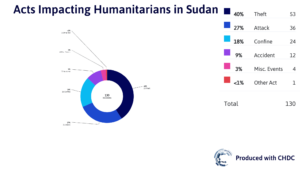In April 2025, we officially resumed full operations in South Sudan with the reopening of our country office in Juba. This marks a key milestone after nearly two years of remote support and underscores INSO’s commitment to enabling humanitarian access and safety in one of the world’s most challenging operational environments.
South Sudan, which gained independence in 2011 following decades of conflict, has since been witnessing several cycles of violence and political instability. A civil war erupted in 2013 and 2016 between forces loyal to President Salva Kiir and those aligned with Vice President Riek Machar, resulting in widespread displacement. A ceasefire has officially been in place since the signing of the Revitalised Peace Agreement in 2018, which considerably reduced the level of conflict, and initiated a relative period of stability. However, the country remained marred by low-intensity skirmishes between government forces and a range of armed actors, particularly in peripheral areas. Intercommunal violence also remains a key feature of South Sudan, fuelled by cycles of cattle raiding, and unresolved ethnic grievances.
Over the last two years, a dire economic situation made worse by the impact of the war in Sudan (loss of crude oil export revenue, hosting of more than million refugees), has been contributing to rising levels of criminality, including abductions, ambushes, looting, and targeted attack, affecting civilians and humanitarian actors alike.
Subsequently, in March 2025, a political and armed conflict resumed between Government forces and forces aligned with Vice President Riek Machar, affecting several peripheral states, triggering massive displacement of populations, and raising fears of the return of a full-fledged conflict across the country.
In this context, NGOs operating environment remains challenging. Armed groups target NGO staff and assets, notably in remote areas. INSO has also reported a growing trend of abductions for ransom, primarily affecting national staff, while humanitarian access in the conflict affected areas is becoming more difficult.
Despite these difficulties, humanitarian organisations have continued to operate across the country. Reliable security information, coordination, and analysis are essential for enabling these actors to manage risk and maintain access to affected populations. This is where INSO plays a critical role.

Incidents Impacting Humanitarians in South Sudan Jan-June 2025
Following nearly two years of sustained dialogue and constructive engagement with national authorities, INSO was successfully re-registered in February 2025. The resumption of in-country operations now allows INSO to re-establish its full field presence and deliver its comprehensive suite of services to NGOs operating in South Sudan. These include:
- 24/7 incident monitoring and verified safety alerts;
- Analytical reports and forecasts tailored to the humanitarian operating environment;
- Regular coordination forums to facilitate shared situational awareness;
- Individual and group briefings, including orientation sessions for new staff;
- Crisis support and advisory services in high-risk situations.
- Training for humanitarian staff, including context-specific sessions on personal safety, access negotiations and crisis management
INSO’s return comes at a critical time, as humanitarian needs continue to rise and operational conditions grow more complex. By strengthening access to timely, independent safety information, INSO aims to enhance collective risk management and support the humanitarian community in reaching those most in need.
If you are a national or international NGO operating in South Sudan, you can register to become an INSO partner directly via our website or reach out to our country office at info@ssd.ngosafety.org
INSO South Sudan is gratefully supported by ECHO AND GMFA.

